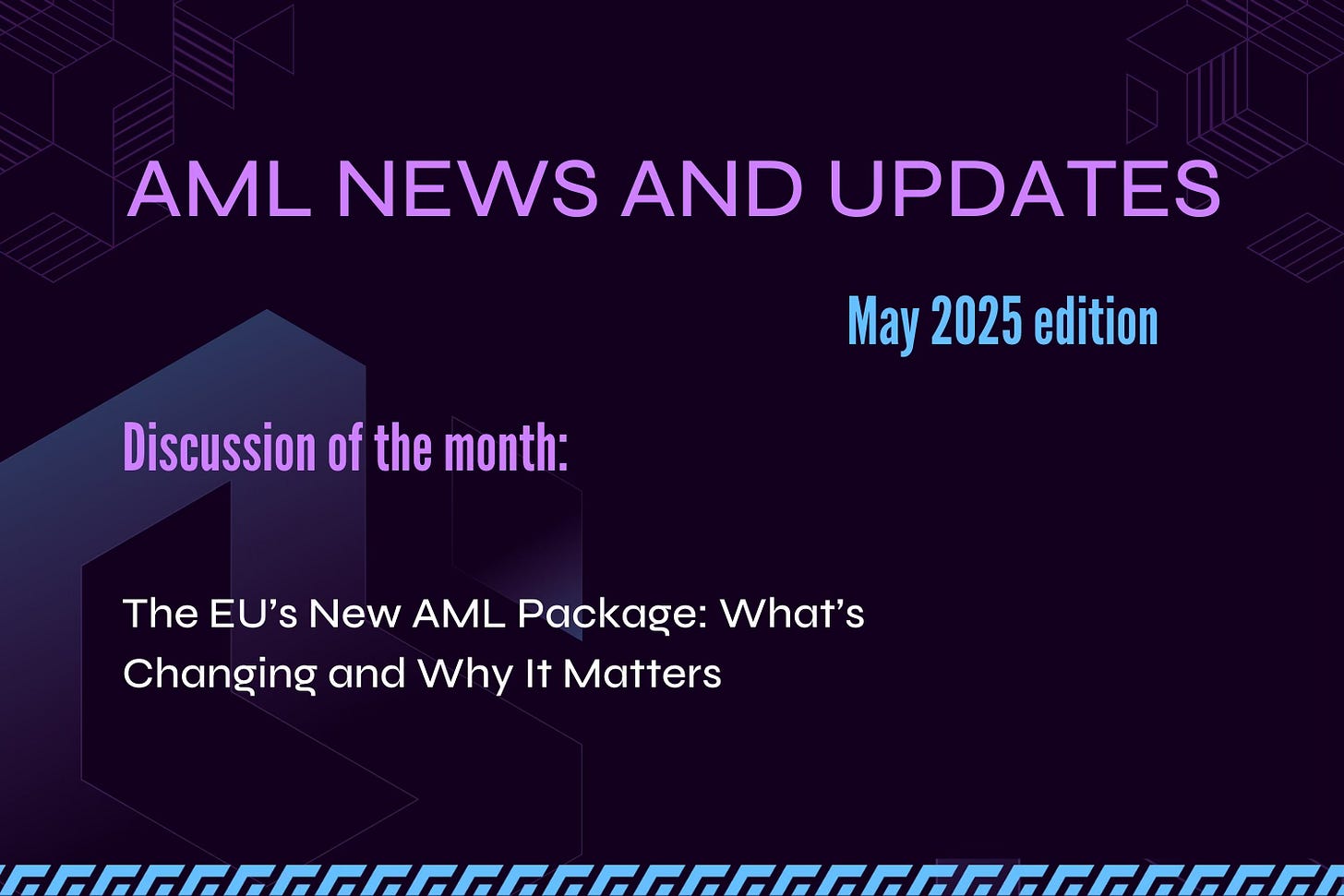The New AML Package | Federal Reserve Updates Approach to Crypto | Fines and Penalties and more
Welcome to our AML News and Updates Newsletter - May 2025 👏
If you didn’t yet download the Anti-Financial Crime 2025 Report, note that it is still available for the next few weeks on our website!
Packed with expert contributions and practical guidance, it’s a must-read for compliance professionals navigating challenges we are all facing in 2025!
Let's see an outline of the topics to be covered in this edition:
Discussion of the month: The EU’s New AML Package: What’s Changing and Why It Matters
Regulatory Developments:
US Federal Reserve Updates Oversight Approach to Crypto Activities
Canada Expands AML/CTF Regime to New Business Sectors
UK Legal Sector Receives Updated AML Guidance
3. Other News:
Block Inc, Fined $40 million
Financial Institution in UAE fined for AML/CFT failures
Peru: Former President Sentenced for Money Laundering
Revolut Fined €3.5M by Lithuanian Regulator Over AML Failings
Found this publication useful?
Let’s start…
The EU’s New AML Package: What’s Changing and Why It Matters
The European Union is implementing the most significant AML reform in its history. This isn’t just a legal update - it’s a fundamental change in how AML rules are applied, supervised, and enforced across the EU.
The new AML Package introduces a consistent, centralised framework that will impact every regulated entity operating in the EU. From large banks to fintechs, from DNFBPs to crypto firms, everyone will need to adapt.
For the first time, AML rules will apply directly in every Member State. No more delays, no more transpositions into national laws. The EU is creating a single rulebook, a new central authority, and stronger expectations for compliance teams, supervisors, and leadership.
Let’s break down the four legal texts of the new package.
1. The AML Regulation (AMLR): The Single Rulebook
This is a regulation - so it applies automatically across all Member States.
It sets out clear, uniform obligations for obliged entities, including:
Customer Due Diligence (CDD)
Politically Exposed Persons (PEPs)
Beneficial ownership identification
Internal controls and governance
Reporting obligations
Key changes under the AMLR:
Expanded scope: New sectors like crowdfunding platforms, investment migration operators, mortgage credit intermediaries, non-financial holding companies, and football clubs/agents (compliance by 2029) are now included.
Lower thresholds: CDD now applies to occasional transactions from €10,000 (down from €15,000). Cash transactions over €10,000 are prohibited. Identification is required for any transaction between €3,000 and €10,000.
Beneficial ownership transparency: Firms must verify ownership of 25% or more and report discrepancies with the beneficial ownership registry within 14 days.
Stronger internal governance: Compliance officers, independent audit functions, business-wide risk assessments, and mandatory training are part of the requirements.
Issuance of RTS: The European Banking Authority (EBA) will publish Regulatory Technical Standards (RTS) that will define minimum standards for onboarding, business-wide risk assessment and CDD.
2. The 6th Anti-Money Laundering Directive (AMLD6)
Unlike the AMLR, AMLD6 is still a directive - but one with clearer and stronger obligations for Member States and authorities…
US Federal Reserve Updates Oversight Approach to Crypto Activities
The Federal Reserve has withdrawn its 2022 and 2023 guidance requiring banks to notify or seek nonobjection before engaging in crypto-asset and dollar token activities. These activities will now be supervised through the standard examination process. Additionally, the Fed and Federal Deposit Insurance Corporation (FDIC) have withdrawn from two joint statements on crypto risks issued with the Office of the Comptroller of the Currency (OCC). The changes reflect a more integrated supervisory approach, aligning oversight with evolving market developments while supporting innovation.
Canada Expands AML/ATF Regime to New Business Sectors
As of April 1, 2025, Canada has extended its AML/ATF obligations to include factors, cheque-cashing businesses, and financing or leasing entities. These sectors must now comply with the Proceeds of Crime (Money Laundering) and Terrorist Financing Act (PCMLTFA), requiring them to implement full compliance programs, carry out customer due diligence, maintain records, and report suspicious transactions. The change marks a significant step in strengthening Canada's AML/CTF framework and closing regulatory gaps across the financial sector.
UK Legal Sector Receives Updated AML Guidance
On 23 April 2025, the Legal Sector Affinity Group (LSAG) published revised AML guidance for legal professionals in the UK, now formally approved by HM Treasury. The new guidance replaces all previous versions and sets updated expectations for compliance with AML/CTF obligations. Legal professionals should review the changes to ensure their internal policies and procedures align with current regulatory standards.
Block Inc, Fined $40 million
Block Inc., the owner of Cash App, has agreed to pay a $40 million fine to New York's Department of Financial Services over AML compliance failures. Regulators cited major gaps in the firm’s Bank Secrecy Act, AML, and KYC programs. Block will also appoint an independent monitor as part of the settlement.
Financial Institution in UAE fined for AML/CFT failures
The Central Bank of the United Arab Emirates (UAE) imposed a financial sanction on a local bank for failing to comply with anti-money laundering and counter-terrorism financing requirements: The penalty followed an official examination that found serious lapses in the bank’s internal controls and procedures. Authorities cited violations of the UAE’s Federal Decree Law on Anti-Money Laundering and its related amendments. No further details on the bank’s identity or the exact penalty amount were disclosed at the time of the announcement.
Peru: Former President Sentenced for Money Laundering
Ollanta Humala, ex-president of Peru, has been sentenced to 15 years in prison - alongside his wife, Nadine Heredia - for laundering campaign funds received from Odebrecht and the Venezuelan government. This marks the third Peruvian president in two decades to be jailed over corruption tied to the Odebrecht scandal, which continues to expose systemic political-financial crime across Latin America.
Revolut Fined €3.5M by Lithuanian Regulator Over AML Failings
The Bank of Lithuania has fined Revolut Bank €3.5 million for serious deficiencies in its anti-money laundering controls, including inadequate customer due diligence, weak transaction monitoring, and poor oversight of high-risk clients. The case highlights regulatory concerns that Revolut’s rapid expansion is outpacing the development of its compliance systems.
Wondering who we are? AML Cube and its associates can assist you with:
AML Compliance
Sanctions Compliance
MiCA Regulations
Cybersecurity / DORA Compliance
Don't hesitate to schedule a call with our team to discuss how we can help.
Wishing you a great month!
Best
Anna Stylianou








